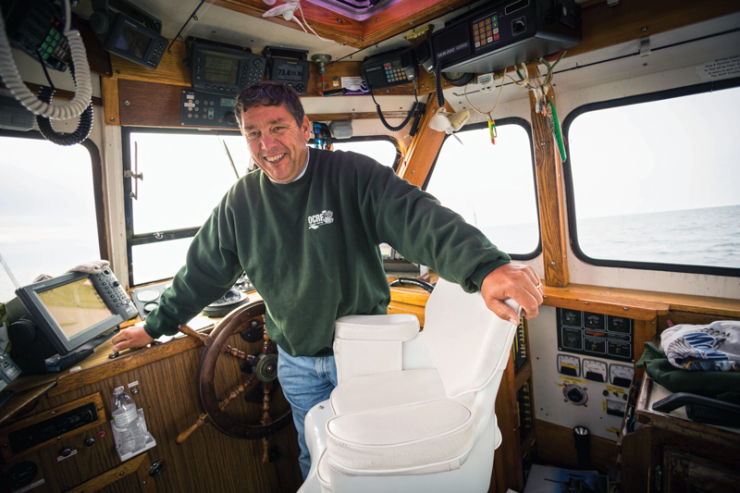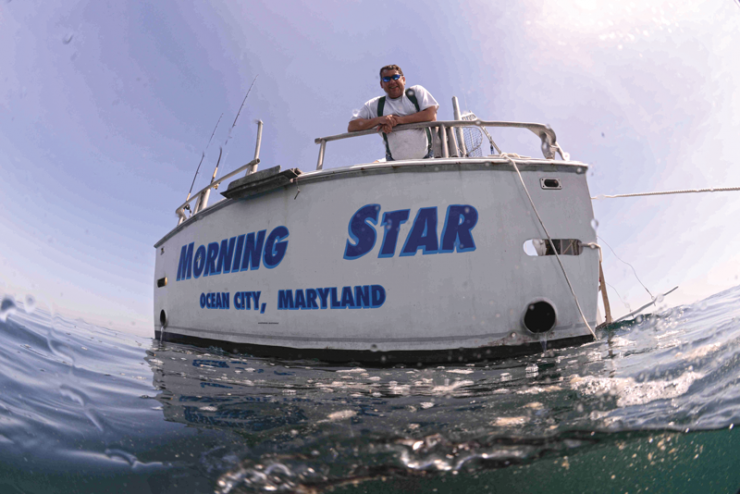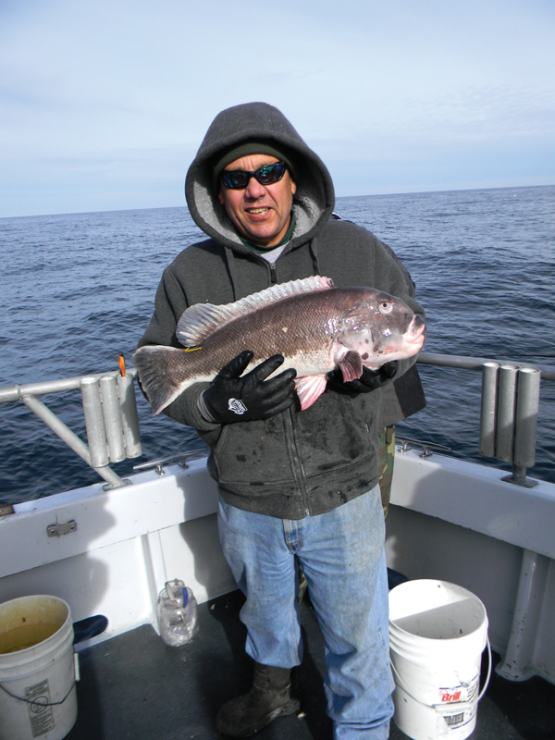For nearly 40 years, Captain Monty Hawkins has fished the waters off the Mid Atlantic as a professional angler. He has been the skipper of the party boat Morning Star, which sails nearly year-round from Ocean City Fishing Center, since 2002. He’s very active in his profession, attending many fishery meetings and chairing Maryland’s Artificial Reef Committee. A man of strong opinions, Captain Hawkins recently shared some of them with PropTalk.
 What do you see as the biggest challenge facing your charter business?
Captain Monty:
What do you see as the biggest challenge facing your charter business?
Captain Monty: The greatest challenge facing all marine recreational fishing businesses today is federal regulatory agencies’ utter reliance on bad catch data. For recreational fish, the expression GIGO (garbage in, garbage out) means instead “Garbage In, No Fishing.” The period of saltwater regulation only began 30 years ago. As each species was regulated, they all saw magnificent population increases despite poor data. Now, several decades in, the easy stuff is done. We need to throw some real numbers on the table or find another way of doing this.
In a time when NOAA’s weather forecasting accuracy has improved wonderfully, they’ll put some recreational catch estimates out that no one, anywhere, has any faith in. But that doesn’t stop these bad estimates from crunching through the system.
When you hear about recreational “overfishing,” you’re most likely really hearing about a series of bad catch estimates. Bad data closes fisheries. Perhaps worse is the cumulative effect on fishery science. People who see the ocean through a computer filtered by recreational catch estimates could not possibly have any idea what’s actually going on at sea.
For these first few decades, fisheries restoration has relied heavily upon catch restriction. Now we must focus more strongly on habitat that’s gone missing and how to put it back.
What’s your most memorable catch?
With 36 years of professional fishing, choosing a “most memorable” is a tough call. Fish my daughter caught as a child are special; so, too, are some really big fish clients had on that got away; a bluefish in the mouth of a rocky river below Cape Cod gave me a fit too when I was 11. Anchored over a barge we’d sunk 12 years earlier, a client hooked one mean monster of a fish. Though I expected a tog, it was a sheepshead of about 12 pounds. I had never seen one. What’s interesting is that archeological digs in St. Mary’s County have numerous sheepshead remains, yet no one can recall a fishery. Now they are a fairly common occurrence on robust artificial reefs.
When oyster reefs grew to the surface—sheepshead. With oysters depleted and that reef ecology absent—no sheepshead.
 What historical person (real or fictional) would you like to fish with and why?
What historical person (real or fictional) would you like to fish with and why?
Where men once targeted white marlin and mahi in blue waters within rowing distance of the beach, now powerful sport boats must run for hours to find bluewater off in the deep. Loss of oysters in the Chesapeake has turned blue seas green. Science will find ecosystem surprises at every turn, we must remain on task.
Yet much of our task is a mystery. Like the sheepshead, we really have no full accounting of what’s missing, especially where seafloor habitats are concerned.
I think for that reason I’d like to go back and fish with Capt. John Martin of Martin’s Seafood in West OC—but when he was a deckhand, so I could pick his captain’s brain.
I just wouldn’t want to go during World War II. Fishing must have been pretty tense with ships sinking regularly, their distant fires easily seen at night. German subs, in fact, were known to commandeer a trawler’s catch. No, I’d want to go with a knowledgeable trawler skipper soon after the inlet was cut, in 1935 or ’36.
 What’s your worst weather experience?
What’s your worst weather experience?
Memorial Day Storm. I think it was 1987. Tucker Colquhoun was my deckhand. I was 35 miles off the beach in a 65-foot wooden party boat when the wind came up what seemed 70 knots out of the northwest. It backed off a touch but (it) blew for a solid three hours. There was no way I could hold course for OC and held for Cape May instead. I had five bilge pumps. They ran constantly. When I could pick up transmissions on the radio, it was all “Maydays.”
With water spouts around, we soon found ourselves going over every sixth or seventh wave—the rest were coming over us. We rode like that for hours. Seven people died on small craft in Delaware Bay and along the Jersey shore. You find out what you have then. It’s probably why I like a strong boat rather than fast and light.
What are your favorite fishing superstitions?
Card playing by crew. Distractions can cause navigation errors. You don’t get many of those. Whistling in the wheelhouse brings wind from the devil? Yeah, um, I don’t know about demonic weather, but it is rude as hell. “No Whistling In The Wheelhouse” is 100 percent enforced on my boat.
Bananas being bad luck is, I believe, 100 percent owed to World War I and WW II convoys. Because banana boats were the slowest craft (the fruit ripened so slowly), Germans often picked off banana boats after Navy escorts were long gone.
Some say it began with spiders, and maybe so. I’m positive about torpedoes. We have the San Gill sitting in 125 feet off water 27 miles off our coast. Folks could see the banana boat’s fire from the beach. It was very bad luck—the worst—to be on a banana boat in the early 1940s.
by Captain Chris D. Dollar What do you see as the biggest challenge facing your charter business?
Captain Monty: The greatest challenge facing all marine recreational fishing businesses today is federal regulatory agencies’ utter reliance on bad catch data. For recreational fish, the expression GIGO (garbage in, garbage out) means instead “Garbage In, No Fishing.” The period of saltwater regulation only began 30 years ago. As each species was regulated, they all saw magnificent population increases despite poor data. Now, several decades in, the easy stuff is done. We need to throw some real numbers on the table or find another way of doing this.
In a time when NOAA’s weather forecasting accuracy has improved wonderfully, they’ll put some recreational catch estimates out that no one, anywhere, has any faith in. But that doesn’t stop these bad estimates from crunching through the system.
When you hear about recreational “overfishing,” you’re most likely really hearing about a series of bad catch estimates. Bad data closes fisheries. Perhaps worse is the cumulative effect on fishery science. People who see the ocean through a computer filtered by recreational catch estimates could not possibly have any idea what’s actually going on at sea.
For these first few decades, fisheries restoration has relied heavily upon catch restriction. Now we must focus more strongly on habitat that’s gone missing and how to put it back.
What’s your most memorable catch?
With 36 years of professional fishing, choosing a “most memorable” is a tough call. Fish my daughter caught as a child are special; so, too, are some really big fish clients had on that got away; a bluefish in the mouth of a rocky river below Cape Cod gave me a fit too when I was 11. Anchored over a barge we’d sunk 12 years earlier, a client hooked one mean monster of a fish. Though I expected a tog, it was a sheepshead of about 12 pounds. I had never seen one. What’s interesting is that archeological digs in St. Mary’s County have numerous sheepshead remains, yet no one can recall a fishery. Now they are a fairly common occurrence on robust artificial reefs.
When oyster reefs grew to the surface—sheepshead. With oysters depleted and that reef ecology absent—no sheepshead.
What do you see as the biggest challenge facing your charter business?
Captain Monty: The greatest challenge facing all marine recreational fishing businesses today is federal regulatory agencies’ utter reliance on bad catch data. For recreational fish, the expression GIGO (garbage in, garbage out) means instead “Garbage In, No Fishing.” The period of saltwater regulation only began 30 years ago. As each species was regulated, they all saw magnificent population increases despite poor data. Now, several decades in, the easy stuff is done. We need to throw some real numbers on the table or find another way of doing this.
In a time when NOAA’s weather forecasting accuracy has improved wonderfully, they’ll put some recreational catch estimates out that no one, anywhere, has any faith in. But that doesn’t stop these bad estimates from crunching through the system.
When you hear about recreational “overfishing,” you’re most likely really hearing about a series of bad catch estimates. Bad data closes fisheries. Perhaps worse is the cumulative effect on fishery science. People who see the ocean through a computer filtered by recreational catch estimates could not possibly have any idea what’s actually going on at sea.
For these first few decades, fisheries restoration has relied heavily upon catch restriction. Now we must focus more strongly on habitat that’s gone missing and how to put it back.
What’s your most memorable catch?
With 36 years of professional fishing, choosing a “most memorable” is a tough call. Fish my daughter caught as a child are special; so, too, are some really big fish clients had on that got away; a bluefish in the mouth of a rocky river below Cape Cod gave me a fit too when I was 11. Anchored over a barge we’d sunk 12 years earlier, a client hooked one mean monster of a fish. Though I expected a tog, it was a sheepshead of about 12 pounds. I had never seen one. What’s interesting is that archeological digs in St. Mary’s County have numerous sheepshead remains, yet no one can recall a fishery. Now they are a fairly common occurrence on robust artificial reefs.
When oyster reefs grew to the surface—sheepshead. With oysters depleted and that reef ecology absent—no sheepshead.
 What historical person (real or fictional) would you like to fish with and why?
Where men once targeted white marlin and mahi in blue waters within rowing distance of the beach, now powerful sport boats must run for hours to find bluewater off in the deep. Loss of oysters in the Chesapeake has turned blue seas green. Science will find ecosystem surprises at every turn, we must remain on task.
Yet much of our task is a mystery. Like the sheepshead, we really have no full accounting of what’s missing, especially where seafloor habitats are concerned.
I think for that reason I’d like to go back and fish with Capt. John Martin of Martin’s Seafood in West OC—but when he was a deckhand, so I could pick his captain’s brain.
I just wouldn’t want to go during World War II. Fishing must have been pretty tense with ships sinking regularly, their distant fires easily seen at night. German subs, in fact, were known to commandeer a trawler’s catch. No, I’d want to go with a knowledgeable trawler skipper soon after the inlet was cut, in 1935 or ’36.
What historical person (real or fictional) would you like to fish with and why?
Where men once targeted white marlin and mahi in blue waters within rowing distance of the beach, now powerful sport boats must run for hours to find bluewater off in the deep. Loss of oysters in the Chesapeake has turned blue seas green. Science will find ecosystem surprises at every turn, we must remain on task.
Yet much of our task is a mystery. Like the sheepshead, we really have no full accounting of what’s missing, especially where seafloor habitats are concerned.
I think for that reason I’d like to go back and fish with Capt. John Martin of Martin’s Seafood in West OC—but when he was a deckhand, so I could pick his captain’s brain.
I just wouldn’t want to go during World War II. Fishing must have been pretty tense with ships sinking regularly, their distant fires easily seen at night. German subs, in fact, were known to commandeer a trawler’s catch. No, I’d want to go with a knowledgeable trawler skipper soon after the inlet was cut, in 1935 or ’36.
 What’s your worst weather experience?
Memorial Day Storm. I think it was 1987. Tucker Colquhoun was my deckhand. I was 35 miles off the beach in a 65-foot wooden party boat when the wind came up what seemed 70 knots out of the northwest. It backed off a touch but (it) blew for a solid three hours. There was no way I could hold course for OC and held for Cape May instead. I had five bilge pumps. They ran constantly. When I could pick up transmissions on the radio, it was all “Maydays.”
With water spouts around, we soon found ourselves going over every sixth or seventh wave—the rest were coming over us. We rode like that for hours. Seven people died on small craft in Delaware Bay and along the Jersey shore. You find out what you have then. It’s probably why I like a strong boat rather than fast and light.
What are your favorite fishing superstitions?
Card playing by crew. Distractions can cause navigation errors. You don’t get many of those. Whistling in the wheelhouse brings wind from the devil? Yeah, um, I don’t know about demonic weather, but it is rude as hell. “No Whistling In The Wheelhouse” is 100 percent enforced on my boat.
Bananas being bad luck is, I believe, 100 percent owed to World War I and WW II convoys. Because banana boats were the slowest craft (the fruit ripened so slowly), Germans often picked off banana boats after Navy escorts were long gone.
Some say it began with spiders, and maybe so. I’m positive about torpedoes. We have the San Gill sitting in 125 feet off water 27 miles off our coast. Folks could see the banana boat’s fire from the beach. It was very bad luck—the worst—to be on a banana boat in the early 1940s.
by Captain Chris D. Dollar
What’s your worst weather experience?
Memorial Day Storm. I think it was 1987. Tucker Colquhoun was my deckhand. I was 35 miles off the beach in a 65-foot wooden party boat when the wind came up what seemed 70 knots out of the northwest. It backed off a touch but (it) blew for a solid three hours. There was no way I could hold course for OC and held for Cape May instead. I had five bilge pumps. They ran constantly. When I could pick up transmissions on the radio, it was all “Maydays.”
With water spouts around, we soon found ourselves going over every sixth or seventh wave—the rest were coming over us. We rode like that for hours. Seven people died on small craft in Delaware Bay and along the Jersey shore. You find out what you have then. It’s probably why I like a strong boat rather than fast and light.
What are your favorite fishing superstitions?
Card playing by crew. Distractions can cause navigation errors. You don’t get many of those. Whistling in the wheelhouse brings wind from the devil? Yeah, um, I don’t know about demonic weather, but it is rude as hell. “No Whistling In The Wheelhouse” is 100 percent enforced on my boat.
Bananas being bad luck is, I believe, 100 percent owed to World War I and WW II convoys. Because banana boats were the slowest craft (the fruit ripened so slowly), Germans often picked off banana boats after Navy escorts were long gone.
Some say it began with spiders, and maybe so. I’m positive about torpedoes. We have the San Gill sitting in 125 feet off water 27 miles off our coast. Folks could see the banana boat’s fire from the beach. It was very bad luck—the worst—to be on a banana boat in the early 1940s.
by Captain Chris D. Dollar